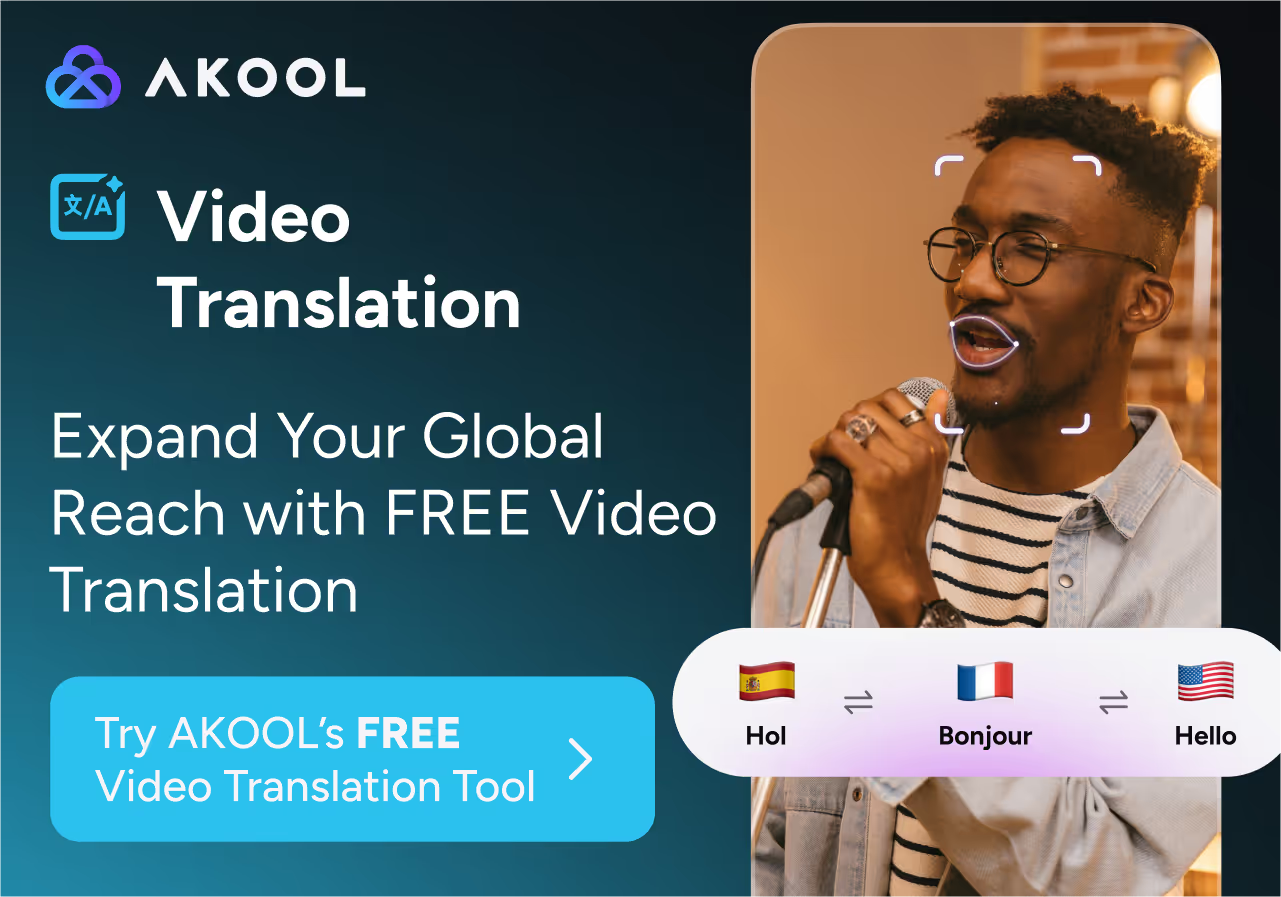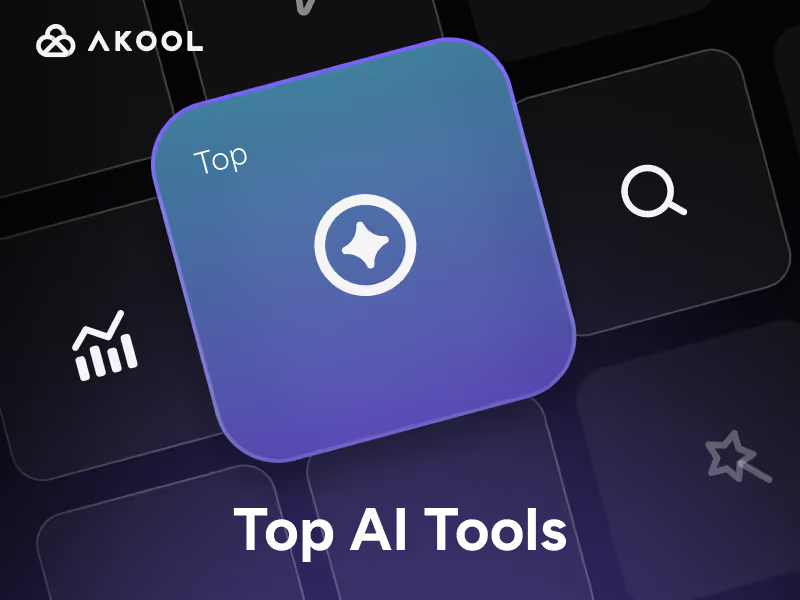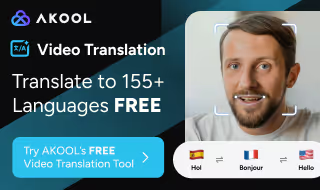AI-powered text-to-video tools are revolutionizing how businesses, marketers, and creators produce video content. No longer limited by camera equipment, actors, or editing expertise, anyone can now transform ideas into engaging videos using only text prompts. With a surge in free and freemium options, choosing the right tool means balancing ease of use, creative flexibility, output quality, and pricing. Below, we break down the top free text-to-video tools—drawing on insights from leading review sites like TechRadar, MakeUseOf, Zapier, Influencer Marketing Hub, and G2 Crowd—to help you find the best fit for your workflow and business needs.
Akool: Best for Flexible, High-Quality AI Video Creation
Akool is an emerging AI video platform designed for both casual creators and professionals seeking a balance of speed, creative control, and accessibility. Its intuitive interface and robust template library make it easy to generate polished videos from text prompts in minutes, catering to marketing, education, and social media use cases. This intuitive approach is highlighted in our complete guide to the top AI video generators in 2025, showing exactly how Akool stacks up against today’s leading platforms. You can also explore comparisons of other text-to-video AI tools in 2025 to see where Akool’s scene-by-scene editing shines. For content teams focused on short-form assets, case studies on generators for social posts, presentations, and tutorials further illustrate the platform’s versatility.
Recent Product Updates in 2025:
- Expanded free plan now includes more monthly video credits, making it easier for small businesses and teams to experiment.
- New video templates tailored for social media and business use, plus improved prompt adherence for more accurate video generation.
- Added support for multiple aspect ratios, optimizing content for TikTok, YouTube, and Instagram.
Key Features:
- Text-to-video with customizable templates
- Multi-language support for over 30 languages
- Scene-by-scene editing timeline
Pricing:
- Free plan: 5 video credits per month (watermarked, 720p export)
- Paid plans from $12/month
Pros:
- Generous free tier for experimentation
- Flexible editing and branding options
- Fast cloud rendering for longer scripts
Cons:
- Watermark on free videos
- Smaller avatar library than enterprise tools
- No built-in audio generation
Practical Use Cases:
- Social media marketing clips
- Localized training or onboarding videos
- Explainer and eLearning modules
Limitations:
- Avatars less lifelike than enterprise options
- Higher-resolution exports require paid plan
- No advanced cinematic effects
Unique Selling Point:Akool’s combination of ease-of-use, flexible editing, and a generous free tier makes advanced text-to-video accessible to individuals and small teams without steep learning curves or upfront costs.

Synthesia: Best for Enterprise-Grade, Lifelike Presenter Videos
Synthesia is a leading AI video generator focused on professional, presenter-led videos using highly realistic digital avatars. Widely adopted by enterprises for training, onboarding, and multilingual communication, it offers a robust suite of features for creating polished, studio-quality videos from text scripts. Synthesia’s avatar realism and language support are unmatched, making it the go-to for organizations that prioritize professionalism and global reach.
Product Updates in 2025:
- Expanded avatar library to over 230 options and now supports 140+ languages.
- Improved AI dubbing for seamless video translation and a new Creator plan with advanced collaboration tools.
Key Features:
- AI avatars & voiceovers in 140+ languages
- Document-to-video conversion (PowerPoint, PDF)
- Video translation and dubbing
Pricing:
- Free plan: 3 minutes/month with 9 avatars
- Paid plans from $29/month
Pros:
- Industry-leading avatar realism
- Extensive multilingual support
- Business integrations and SCORM export
Cons:
- Limited creative flexibility
- Higher starting price for longer videos
- No native background music
Practical Use Cases:
- Corporate training materials
- eLearning course videos
- Executive updates and announcements
Limitations:
- Not suited for cinematic or storytelling projects
- Very limited free-plan minutes
- External audio editing required
Unique Selling Point:Synthesia excels at enterprise-grade, multilingual presenter videos where avatar realism and professional consistency are non-negotiable.
Alibaba Qwen: Best for Unlimited Free Prototyping and Ideation
Alibaba Qwen offers a completely free text-to-video tool as part of its broader AI suite, allowing users to generate unlimited short videos from prompts. While the output quality is basic, Qwen is ideal for rapid prototyping and creative experimentation without any cost barriers. You can experiment alongside the best free text-to-video generators that turn words into videos in minutes, making Qwen a favorite for early-stage ideation.
Product Updates in 2025:
- Integrated with Qwen 2.5 Max for improved accessibility.
- Enhanced rendering speed and prompt adherence.
Key Features:
- Unlimited, watermark-free generations
- Simple text-to-video workflow
- Basic editing tools for iterative refinement
Pricing:
- Completely free with no usage limits
Pros:
- Zero cost, no watermark
- Ideal for quick drafts and storyboarding
- Rapid prompt testing
Cons:
- Inconsistent output quality
- No audio or image-to-video support
- Short 5-second clip limit
Practical Use Cases:
- Storyboarding and idea visualization
- Prompt experimentation for marketing
- Quick social media drafts
Limitations:
- Clips capped at 5 seconds
- Occasional rendering failures
- Not suited for final production
Unique Selling Point:Qwen’s unlimited, no-cost video generation makes rapid ideation and prototyping frictionless for teams and individuals.
Runway: Best for Advanced Cinematic AI Video Creation
Runway is a powerful web-based platform offering advanced AI video generation and editing tools, aimed at filmmakers, content creators, and artists. Unlike most text-to-video tools, Runway provides cinematic controls and high-fidelity models, making it a top choice for those seeking creative freedom. Runway recently earned praise in our overview of AI text-to-video platforms for fast content creation, thanks to its Gen-3 Alpha model and inpainting features. Creative teams have also compared its cinematic controls to other AI-driven tools for marketing, underscoring its versatility.
Product Updates in 2025:
- Launched Gen-3 Alpha high-fidelity video model.
- Expanded free plan to 125 credits.
- Added camera movement controls and inpainting tool.
Key Features:
- Image-to-video & text-to-video generation
- Motion brushes, camera angle adjustments
- Browser-based workflow with cloud rendering
Pricing:
- Free plan: 125 credits for basic image-to-video
- Paid plans from $12/month (annual billing)
Pros:
- Advanced creative control
- Cinematic output quality
- Accessible free tier
Cons:
- Steep learning curve
- No native audio
- Text-to-video limited on free plan
Practical Use Cases:
- Short film prototyping
- Stylized social media clips
- Artistic experimentation
Limitations:
- Clip length and resolution caps
- No presenter avatars
- Requires prompt engineering
Unique Selling Point:Runway’s filmmaker-oriented controls and browser-based workflow deliver professional cinematic results without traditional editing software.
Hailuo: Best for Realistic Short Videos with Generous Free Credits
Hailuo is a Chinese AI video generator known for its generous daily free credits and impressive prompt interpretation. Supporting both text-to-video and image-to-video workflows, Hailuo is practical for users needing realistic short-form videos on a budget. Anyone who’s sampled free AI video generators with text-to-speech will appreciate Hailuo’s daily credit model, and content creators familiar with text-to-video generators every YouTuber should try will find its subject reference feature invaluable.
Product Updates in 2025:
- Introduced subject reference for consistent character appearance.
- Improved rendering speed and added camera presets.
Key Features:
- 100 daily free credits
- Subject reference image uploads
- Image-to-video support
Pricing:
- Free plan: 100 credits/day
- Standard plan: $14.90/month for 1,000 credits
- Unlimited plan: $94.90/month
Pros:
- Generous free usage
- Strong prompt adherence
- Realistic short-clip motion
Cons:
- Videos capped at 6 seconds
- No built-in audio
- Occasional detail loss
Practical Use Cases:
- Storyboarding realistic scenes
- Product demo clips
- Quick social media videos
Limitations:
- No native audio or voiceovers
- Short-form only
- Manual stitching for longer content
Unique Selling Point:Hailuo’s combination of generous credits and accurate visual interpretation makes it ideal for realistic short videos without upfront costs.
Feature Comparison and Market Context
Across the landscape, all leading text-to-video tools offer free plans with varying limitations, but feature depth and creative flexibility differ significantly. Akool and Hailuo stand out for generous free tiers, while Synthesia leads in avatar realism and enterprise features. Runway is unmatched for cinematic control, and Alibaba Qwen offers truly unlimited, watermark-free generations despite basic output quality.
For businesses, the choice comes down to priorities: Akool for flexible, high-quality creation; Synthesia for professional presenter videos; Qwen for unlimited prototyping; Runway for cinematic projects; and Hailuo for realistic short clips. As AI video tools evolve, expect enhancements in output quality, automation, and accessibility—making these solutions essential for every modern team. For a broader look at the landscape, don’t miss our roundup of must-know free AI video generators.
Frequently Asked Questions
What is a text-to-video tool?
A text-to-video tool uses AI to turn written prompts or scripts into video clips, often with customizable templates, avatars, or scenes. These tools help users create videos without filming or editing experience.
Are free text-to-video tools suitable for business use?
Yes, many free plans offer enough features for basic marketing, training, or social content. However, free versions may have watermarks, limited resolution, or shorter video lengths compared to paid plans.
Can I add my own audio or voiceover to videos made with these tools?
Some tools allow you to upload audio or use built-in text-to-speech. Others may require you to add audio externally after exporting the video.
How do these tools handle different languages?
Most leading text-to-video platforms support multiple languages, allowing you to create videos with localized voiceovers or subtitles for global audiences.
What are the main limitations of free text-to-video tools?
Common limitations include watermarks, capped video length or resolution, limited editing options, and fewer templates or avatars compared to paid versions.








